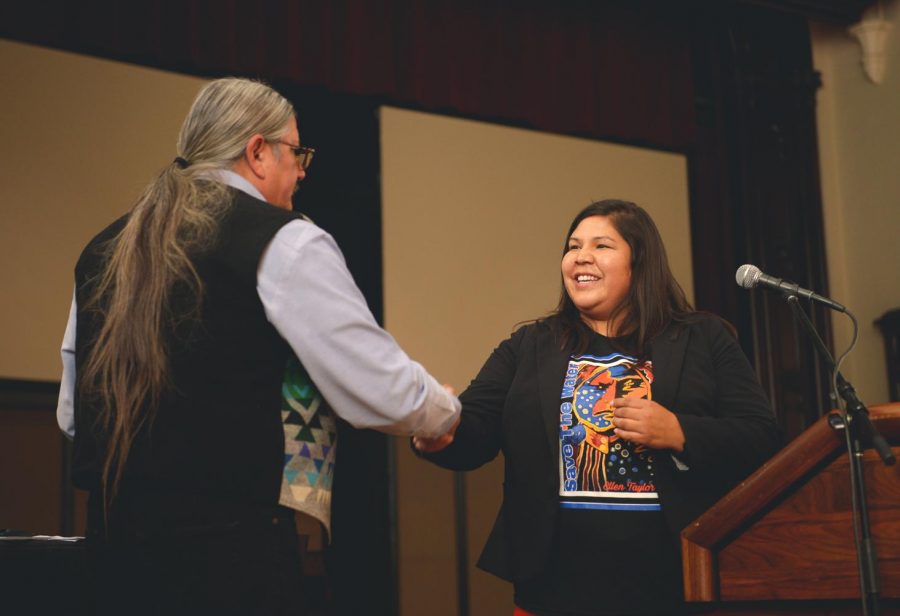University of Idaho celebrates Indigenous Peoples’ Day
Shoshone-Paiute speaker asked students to choose understanding over ignorance
MICHAEL LINDER | The Daily Evergreen
Sydel Samuels, director of the University of Idaho’s Native American Student Center, greets Pete Purtra of the Shoshone-Paiute tribe, during Indigenous Peoples’ Day events Monday.
October 9, 2017
A Shoshone-Paiute tribe representative and students gathered Monday at the University of Idaho campus to celebrate Indigenous Peoples’ Day through a speaker event focused on peace and love.
Sydel Samuels, the director of the Native American Student Center of UI, helped organize the event for the second year. She said the center invited a Nez Perce elder last year and wanted to bring in bring in another leader this year.
UI President Chuck Staben said the event aims to promote diversity and inclusion at UI.
“Today is a good opportunity for us to reflect [on] our history and our future,” he said.
Staben said he was happy that both the university and the City of Moscow recognize Oct. 9 as Indigenous Peoples’ Day, instead of Columbus Day.
Pete Putra, tribal administrator of Shoshone-Paiute Tribes, explained how Christopher Columbus and non-native immigrants that came to this country committed genocide against the indigenous tribes.
“A lot of our people met them,” Putra said. “A lot of tribes died of disease [and] war.”
He said he has seen poverty affect indigenous tribes in both North and South America, adding that in the United States, one of the richest countries in the world, native people should not go hungry.
Putra spoke on indigenous cultural values and used native stories and myths to convey to the audience messages of love and peace.
Putra used an analogy to convey a message about ignorance. In the analogy, four brothers of different races were created. Their creator told them to go into the world and rule over water, earth, fire and air.
On the screen behind him, a symbol resembling a medicine wheel represented the four brothers. He continued the story — each of the brothers would go out into the world and settle on different continents.
The symbol he displayed on the screen shifted into a swastika. He said that in World War II, Hitler turned a symbol of peace and harmony into one of ignorance and hatred.
Putra said the four-brothers analogy is meant to convey how there are different types of racism in the world, and how many of the issues people face today aren’t about racism.
“It’s about ignorance,” he said, “and not understanding, and not really knowing.”
He told the audience that when one of these groups gains too much power, the balance in the world shifts.
Putra said he hoped his teachings would help the audience to understand that they can change the way they view the world.
“The big thing for an individual to take away is ‘Maybe I can change,’” he said, “or ‘Maybe I could do things differently.’ ”









